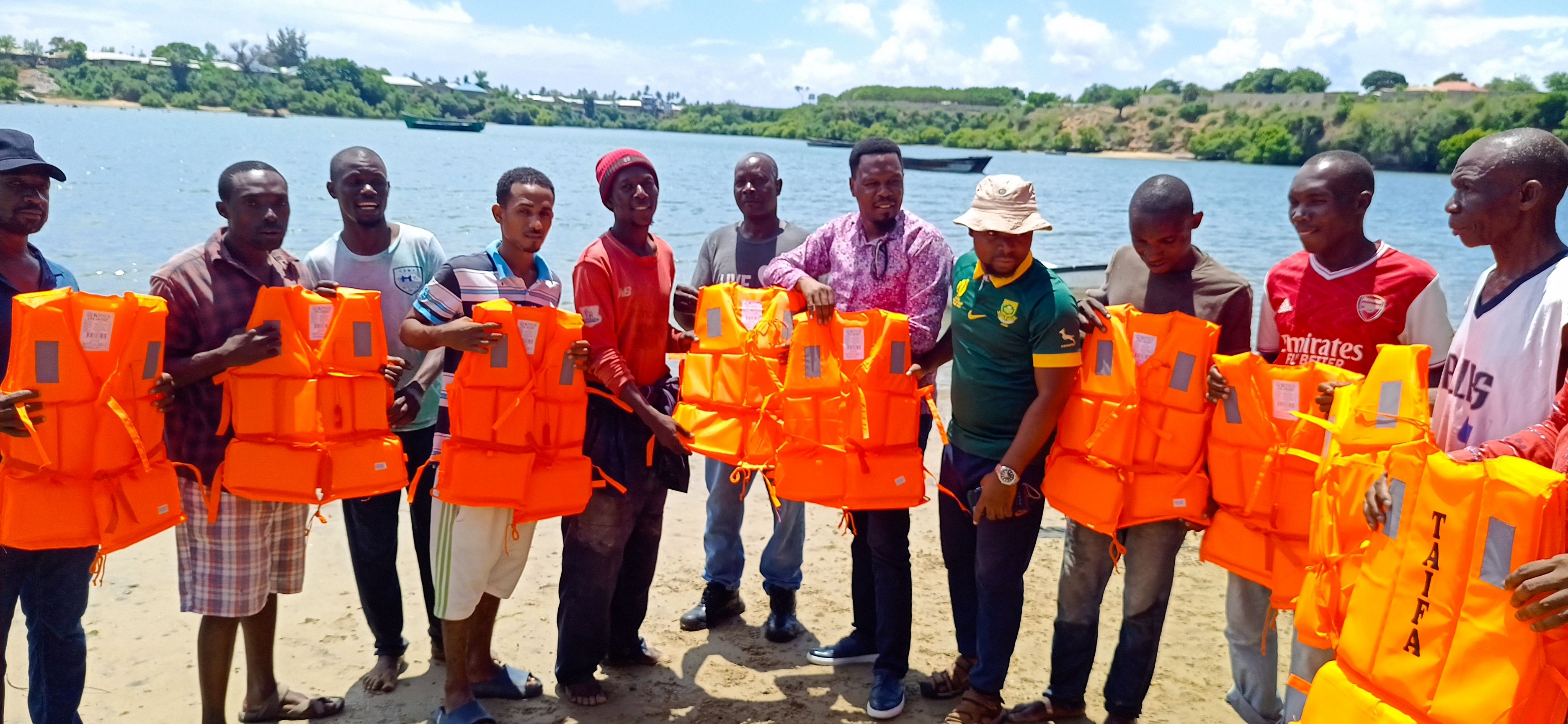

Hamisi Mwaguya [fifth R] with residents at Mweza Creek in Mtongwe on Thursday / BRIAN OTIENO
Preparations for the second edition of the East Africa Ocean Festival are in top gear as stakeholders rally residents to protect and conserve the marine ecosystem.
On Saturday, stakeholders from different agencies will cleanup the Nyali beach as part of the
precursor events to the festival set for October 9 and 10.
“In October, we will have a festival, which will be part of the celebration of the coastal
culture and heritage. It will include water sports, food varieties and
entertainment at the Tudor Creek. This will be the second edition of the East
African Ocean Festival,” said Hamisi Mwaguya, the founder of the East African Ocean
Festival.
Speaking at Jumeirah Beach Front on Thursday, he said there will be a walk from Saba Saba from 6 am to Jumeirah Beach
front, where the clean-up will start at 8 am.
Mwaguya said the ocean is the mother of all marine
microorganisms and they need to be protected for food security.
“Let us protect the ocean because it is a key
component of human lives and the creatures that live in the ocean,” the former
Kenya Maritime Authority chairman said.
The cleanup drive will involve stakeholders including Jumeirah Beach Front Apartments, Kenya Coast Guard
Service, Mombasa county government, Architectural Association of Kenya, Mombasa
Walk Movement, Baus Taka, Nyali Beach Management Unit, Camel Riders
Association, Kenya Wildlife Service, among others.
The festival has three objectives—reimagining our waterfront (ROW), which aims to sustainably develop the Coast’s
waterfronts; protecting the marine environment; and to celebrate the coastal
heritage and culture, which is closely linked to the ocean.
Mwaguya said conservation of the marine ecosystem
is key for the growth and development of coastal counties.
He said there is a lot of heritage along the Tudor
creek that needs to be harnessed to attract tourists.
The National Museums of Kenya will be hosting the
second edition of the festival.
Mwaguya said plastic waste should never find its
way to the beach.
Last year, the stakeholders collected about 10
tonnes of waste along the Nyali beach.
Architectural Association of Kenya Mombasa branch
chairman Dancan Odhiambo said for the last 58 years, architects have been involved
in such cleanups as part of their commitments to conservation of the
environment.
He said sustainable development cannot be delinked
from marine conservation.
“Our blue economy contributes roughly two per cent
to the GDP, which is around Sh178 billion. This is below the global average,”
Odhiambo said.
He said with this in mind, more participation of
more stakeholders in marine conservation, will boost the blue economy’s
contribution to the GDP.
“As built environment professional, our main
agenda is to ensure Kenya grows in a context that is sustainable and sensitive
to the environment,” Odhiambo said.
He said as architects, they consider many
things when designing buildings, including how they would treat solid and
non-solid waste, especially for buildings that are near the ocean.
Odhiambo said architects try as much as possible
to use green spaces optimally and ensure the buildings they design use as much
natural and environmentally safe materials as possible.
Kenya Coast Guard Service’s sub-lieutenant Deborah
Karimi said apart from providing safety and security to the people, they also
provide protection of marine resources.
She said many Kenyans do not realise the dangers
they pose to the economy when they pollute the marine ecosystem.
“The responsibility of keeping our beaches clean
is for all of us,” Karimi said.
She urged the public to come out in large
numbers on Saturday to clean up Nyali beach as a show of commitment to the
cause and patriotism.
Haitham Faeed, Mombasa county solid waste
management officer, said fisherfolk have been the greatest victims of marine
pollution because fish run away from the shorelines and go deeper into the
ocean to seek cleaner environments.
This affects the fishermen because they do not
have the facilities to go into the deep waters to fish.
“Many nowadays come back empty-handed after going
into the sea. That means their families lack food when this happens,” Fareed
said.
Baus Taka Enterprise co-founder and executive
director Taiba Hatimy said Saturday’s beach cleanup will educate participants
and the local community on the essence of conserving the marine ecosystem.
“One of the reasons for the beach cleanup is for
the local community to see when they don’t implement responsible and
sustainable waste management practices we end up having waste, especially
plastic waste, ending up in the ocean causing marine plastic pollution,” Hatimy
said.
Marine plastic pollution kills marine
biodiversity, affects food security, community health and aggravates climate
change, she said.
“The ocean is one of the major carbon sinks and
the local community needs to learn more about responsible waste management,”
Hatimy noted.
The aim of the cleanup is to help inspire long
lasting behaviour change in the mindset of residents from irresponsible to
responsible waste management.
She said waste should be segregated at source and then recycled.
The cleanup, she said, will help come up with a
waste audit to know which producers need to be held liable, for polluting the
marine ecosystem.
Instant Analysis:
The first edition of the East African Ocean
Festival was held in Mombasa last October and it attracted more than 5,000 people—participants and audience. The festival is meant to raise awareness on the
importance and value of the ocean.


















